Effective Waste Handling: Key Strategies for a Cleaner, Safer Site
Date Posted:13 September 2024
Effective waste handling is essential for maintaining a safe, efficient, and environmentally responsible work environment.
Waste management is a critical aspect of any construction site, industrial facility, or commercial operation. Proper waste handling not only ensures compliance with environmental regulations but also contributes to a safer, more efficient working environment. This blog explores effective waste handling strategies, the importance of proper waste management, and practical tips for implementing a successful waste handling system.

The Importance of Proper Waste Handling
Effective waste handling is crucial for several reasons:
- Environmental Protection: Improper disposal of waste can lead to environmental contamination and harm local ecosystems. Proper waste handling ensures that waste is managed responsibly, reducing the impact on the environment.
- Regulatory Compliance: Many regions have stringent regulations regarding waste management. Adhering to these regulations helps avoid legal penalties and ensures that your operations meet environmental standards.
- Safety: Waste that is not properly managed can create hazards on site, such as slips, trips, and falls, or exposure to harmful substances. Effective waste handling helps maintain a safe working environment for employees.
- Operational Efficiency: A well-organised waste handling system can improve operational efficiency by streamlining waste disposal processes and reducing the time and resources spent on waste management.
Types of Waste and Handling Methods
Different types of waste require different handling methods. Here’s an overview of common waste types and how to manage them:
- General Waste: This includes everyday waste materials such as packaging, food waste, and paper. General waste should be collected in designated bins and disposed of through regular waste collection services. Using clearly labelled bins and encouraging proper segregation can help manage general waste effectively.
- Recyclable Waste: Materials such as glass, plastic, paper, and metal can be recycled. Setting up separate recycling bins for each type of recyclable material helps ensure that these materials are sorted correctly. Partnering with a recycling service can facilitate proper processing and reduce landfill waste.
- Hazardous Waste: This includes materials that pose a risk to health or the environment, such as chemicals, batteries, and asbestos. Hazardous waste requires special handling and disposal procedures. Ensure that hazardous waste is stored in designated containers and managed according to local regulations. Work with licensed hazardous waste disposal contractors to ensure safe and compliant disposal.
- Construction and Demolition Waste: This type of waste includes debris from construction, renovation, or demolition activities. It often includes materials such as concrete, wood, and metal. Construction and demolition waste should be sorted into different categories for recycling or disposal. Implementing on-site waste segregation and recycling programs can help manage this type of waste effectively.
Implementing an Effective Waste Handling System
To manage waste efficiently, follow these steps:
- Conduct a Waste Audit: Start by assessing the types and quantities of waste generated on-site. A waste audit helps identify key areas where waste reduction can be achieved and informs the development of a waste management plan.
- Develop a Waste Management Plan: Create a comprehensive waste management plan that outlines waste handling procedures, segregation practices, and disposal methods. Include details on how to manage different types of waste, storage requirements, and the roles and responsibilities of staff.
- Provide Training: Ensure that all employees are trained in proper waste handling procedures. Training should cover the correct use of waste bins, segregation practices, and safety measures for handling hazardous materials.
- Implement Waste Segregation: Use clearly labelled bins and containers to segregate different types of waste. This helps ensure that waste is disposed of correctly and facilitates recycling and recovery efforts.
- Monitor and Review: Regularly monitor waste handling practices to ensure compliance with the waste management plan. Conduct periodic reviews to identify areas for improvement and make necessary adjustments to enhance efficiency and effectiveness.
- Promote Waste Reduction: Encourage practices that reduce waste generation, such as using reusable materials, minimising packaging, and adopting sustainable practices. Waste reduction not only helps lower disposal costs but also contributes to environmental sustainability.
Best Practices for Waste Handling
Adopting best practices in waste handling can further improve your waste management system:
- Use Durable Containers: Invest in high-quality, durable waste containers that can withstand the rigours of waste handling. Ensure that containers are clearly labelled and easy to use.
- Maintain Cleanliness: Keep waste storage areas clean and well-organised. Regularly clean containers and storage areas to prevent odours and pests.
- Engage with Waste Management Services: Work with professional waste management services to ensure proper disposal and recycling. Regularly review contracts and service agreements to ensure they meet your needs.
- Encourage Employee Involvement: Involve employees in waste management efforts by promoting awareness and encouraging participation in recycling and waste reduction initiatives.





























































































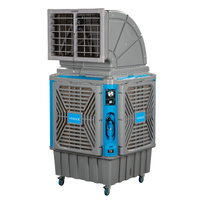









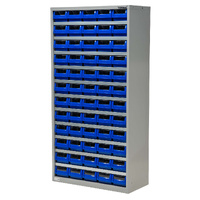












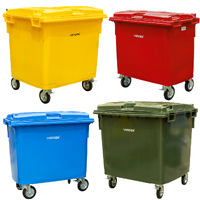











 Trolleys & Hand Trucks
Trolleys & Hand Trucks Cage Trolleys
Cage Trolleys Cleaning Carts & Trolleys
Cleaning Carts & Trolleys Construction Trolleys
Construction Trolleys Custom Trolleys
Custom Trolleys Hand Trucks & Dollies
Hand Trucks & Dollies Laundry/Linen Trolleys
Laundry/Linen Trolleys Lifting Trolleys
Lifting Trolleys Order Picking Trolleys
Order Picking Trolleys Panel Cart Trolleys
Panel Cart Trolleys Platform Trolleys
Platform Trolleys Powered Trolleys
Powered Trolleys Shelf & Tiered Trolleys
Shelf & Tiered Trolleys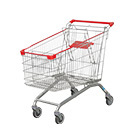 Shopping Trolleys
Shopping Trolleys Stainless Steel Trolleys
Stainless Steel Trolleys Tool Trolleys
Tool Trolleys Utility & Service Carts
Utility & Service Carts Lifting & Handling Equipment
Lifting & Handling Equipment Forklift Attachments
Forklift Attachments Jib Attachments
Jib Attachments Lifting Hoists & Pallet Hooks
Lifting Hoists & Pallet Hooks Load Skates & Tow Tugs
Load Skates & Tow Tugs Manual Stackers & Lifters
Manual Stackers & Lifters Pallet Jacks
Pallet Jacks Pallet Lifters
Pallet Lifters Pallet Rotators & Dispenser
Pallet Rotators & Dispenser Powered Pallet Trucks & Electric Lifters
Powered Pallet Trucks & Electric Lifters Scissor Lift Trolleys and Tables
Scissor Lift Trolleys and Tables Conveyor Equipment
Conveyor Equipment Conveyor Frames & Stands
Conveyor Frames & Stands Roller & Skate Conveyors
Roller & Skate Conveyors Ladders & Access Equipment
Ladders & Access Equipment Container & Yard Ramps
Container & Yard Ramps Ladders & Step Stools
Ladders & Step Stools Work Platforms & Crane Cages
Work Platforms & Crane Cages Drum Handling Equipment
Drum Handling Equipment Drum Storage & Bunding
Drum Storage & Bunding Drum Trolleys & Lifters
Drum Trolleys & Lifters Forklift Drum Handling
Forklift Drum Handling Waste Handling & Bins
Waste Handling & Bins Bin Lifters & Tippers
Bin Lifters & Tippers Plastic Waste & Wheelie Bins
Plastic Waste & Wheelie Bins Steel Waste & Tipping Bins
Steel Waste & Tipping Bins Waste Carts
Waste Carts Dangerous Goods Storage & Spillage
Dangerous Goods Storage & Spillage Aerosol Cans Storage Cages
Aerosol Cans Storage Cages Bunded Pallets & Storage
Bunded Pallets & Storage Corrosive Goods Storage Cabinets
Corrosive Goods Storage Cabinets DG Storage & Trolleys
DG Storage & Trolleys Flammable Liquid Cabinets
Flammable Liquid Cabinets Forklift Gas Storage Cages
Forklift Gas Storage Cages Site Storage
Site Storage Spill Kits
Spill Kits Shelving & Storage Equipment
Shelving & Storage Equipment Stillage & Transport Cages
Stillage & Transport Cages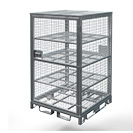 750 Series Cage Configurations
750 Series Cage Configurations Heavy Duty Cabinets
Heavy Duty Cabinets Heavy Duty Shelving
Heavy Duty Shelving Mega Bins & Pallets
Mega Bins & Pallets Packing & Workbenches
Packing & Workbenches Parts Trays & Stor-Pak Bins
Parts Trays & Stor-Pak Bins Pegboard & Louvre Panels
Pegboard & Louvre Panels Plastic Bins & Crates
Plastic Bins & Crates Plastic Handling Solutions Bins
Plastic Handling Solutions Bins Plastic Pallets
Plastic Pallets Stack & Nest Bins
Stack & Nest Bins Pallet Racking Accessories
Pallet Racking Accessories Workplace Equipment
Workplace Equipment Modular Workbenches
Modular Workbenches Electric Height-Adjustable Workbenches
Electric Height-Adjustable Workbenches Floor Matting
Floor Matting General Workplace Equipment
General Workplace Equipment Industrial Weighing Scales
Industrial Weighing Scales Packaging Machinery
Packaging Machinery Stationery Cupboards
Stationery Cupboards Storage and Stillage Cages
Storage and Stillage Cages Tool Trolleys
Tool Trolleys Tooling Cabinets
Tooling Cabinets Workshop Fans and Coolers
Workshop Fans and Coolers Safety Barriers, PPE & Signage
Safety Barriers, PPE & Signage Barriers & Bollards
Barriers & Bollards First Aid Equipment
First Aid Equipment Gloves, Knives and PPE
Gloves, Knives and PPE Signage
Signage Cleaning & Site Supplies
Cleaning & Site Supplies Cleaning Equipment
Cleaning Equipment Cleaning Trolleys
Cleaning Trolleys Rubbish Bins
Rubbish Bins Signs & Traffic Supplies
Signs & Traffic Supplies Construction Equipment
Construction Equipment Construction Trolleys
Construction Trolleys Waste Handling
Waste Handling General Site Equipment
General Site Equipment Concrete Equipment
Concrete Equipment Site Storage
Site Storage Lifting Equipment
Lifting Equipment Verdex Specials
Verdex Specials









